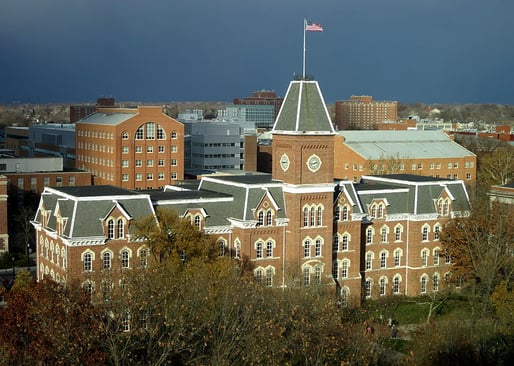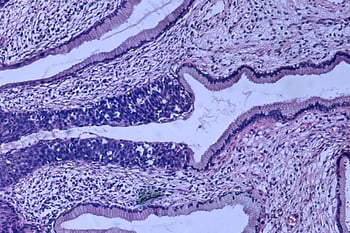Researchers from UCLA and partnering schools guided by Laurent Bentolila found evidence supporting the spread of malignant cells through angiotropism with vascular co-option, and even suggested they may be related or identical processes. These findings were published in Nature Scientific Reports. With angiotropism being the ability for cells to travel along surface of blood vessels, but not be inside of them, also called extravascular migratory metastasis (EVMM) and vascular co-option being the ability for a tumor to use a blood supply and travel along it, this means cancer has an outlet to spread outside of the bloodstream. The spread outside of the bloodstream means some current methods of treating cancer would be ineffective.
“... if the metastasizing cells are on the outside of the blood vessels, they escape exposure to the treatment and continue to spread cancer.”
-Laurent A. Bentolila
Read More
Tags:
CA,
University of California Los Angeles,
cancer research,
Los Angeles,
Cancer,
LAVS,
UCLA,
laboratory,
lab products,
2016

(Image courtesy of Wikimedia Commons)
Dr. Abraham Badu-Tawiah, assistant professor at Ohio State University, is out to revolutionize the world of diagnostic testing. By making paper strips that can detect malaria and well as certain types of cancers, he hopes to make testing more practical and affordable. People would be able to simply apply a drop of blood to the paper test strip at home, much like diabetics do when testing their blood sugar, and then mail it to the laboratory. This new method would make medical diagnostics much more accessible for those who can't easily get to a lab for testing.
Read More
Tags:
Midwest,
Ohio State University,
Ohio,
Cancer,
malaria,
biotech vendor show,
Columbus,
Dr. Abraham Badu-Tawiah
 (Image courtesy of Wikimedia commons)
(Image courtesy of Wikimedia commons)
University of Alabama at Birmingham received a $29 million grant from the National Cancer Institute. This five year core grant will support six research programs at the UAB Comprehensive Cancer Center. The renewal of the Cancer Center Support Grant, the most prestigious federal grant that a cancer research and treatment program can earn, also extends UAB’s elite “comprehensive” designation. According to the UAB News website this designation is awarded for scientific excellence and the ability to integrate diverse research approaches in the fight against cancer.
Read More
Tags:
Bioresearch funding,
cancer research,
Alabama,
University of Alabama,
Cancer Treatment,
Cancer,
University of Alabama Birmingham,
UAlab,
UAB,
University of Alabama at Birmingham,
Cancer Center,
cancer researchers,
fight cancer,
2016,
cancer reserach,
Bioresearch Grant,
Comprehensive Cancer Center
Study Shows Chemopreventative Potential of Kava-Derived Compound
Sometimes, the most simple and elegant solution to a problem has already been known for centuries.
University of Minnesota researchers have explored the medicinal capacity of an ancient plant -
Piper methysticum, c
ommonly known as kava. However, concerns about kava being toxic to the liver have resulted in diminished use. Now, a recently published study has found that a specific kava derivative may have potential to combat cancer without causing any damage to liver cells.
get more information about UMINN research programs
by clicking the button below

Read More
Tags:
Midwest,
University of Minnesota,
cancer research,
Minnesota,
University of Minnesota Twin Cities,
Cancer,
BioResearch Product Faire Event,
Minneapolis,
MN,
UMinn,
2016,
lung cancer

Researchers at the University of Rochester School of Medicine are using a special breed of frogs to study human diseases such as cancer. It turns out our amphibious friends have a lot to teach us about how tumors grow.
Read More
Tags:
cancer research,
New York,
Cancer,
tumor cells,
University of Rochester,
University of Rochester Medical Center,
Dr. Jacques Robert,
South African clawed frogs
 In 1962, John F. Kennedy declared that the United States would go to the moon and in 1969, we did. Now President Obama is calling for the same level of national focus and dedication to win the war against cancer. He announced a new “moonshot” during his last State of the Union Address - a moonshot to cure cancer.
In 1962, John F. Kennedy declared that the United States would go to the moon and in 1969, we did. Now President Obama is calling for the same level of national focus and dedication to win the war against cancer. He announced a new “moonshot” during his last State of the Union Address - a moonshot to cure cancer.
Read More
Tags:
Aging,
Cancer,
Biomedical Research Funding,
University of Rochester
 Cervical cancer is the third leading cause of cancer deaths for women worldwide, with more than 500,000 new cases per year. In the United States, however, early screening and HPV vaccine have resulted in a decline in U.S. rates to approximately 12,000 cases annually.
Cervical cancer is the third leading cause of cancer deaths for women worldwide, with more than 500,000 new cases per year. In the United States, however, early screening and HPV vaccine have resulted in a decline in U.S. rates to approximately 12,000 cases annually.
Read More
Tags:
University of Wisconsin Madison Research Park,
cancer research,
Wisconsin,
UWiscRP,
UWisc,
Cancer,
UW Madison,
2015,
BioResearch Product Faire Front Line Event,
BioResearch Product Faire Event,
Madison
 According to the National Cancer Institute (NCI), ovarian cancer accounts for approximately 3 percent of all cancers in women and is the fifth leading cause of cancer-related death among women in the United States. Ovarian cancer causes more deaths than any other female reproductive system cancer, due in part to a lack of symptoms during early stages and a lack of effective screening tests. In 2014, for example, an estimated 22,000 women were diagnosed with ovarian cancer in the United States, and approximately 14,000 died of the disease.
According to the National Cancer Institute (NCI), ovarian cancer accounts for approximately 3 percent of all cancers in women and is the fifth leading cause of cancer-related death among women in the United States. Ovarian cancer causes more deaths than any other female reproductive system cancer, due in part to a lack of symptoms during early stages and a lack of effective screening tests. In 2014, for example, an estimated 22,000 women were diagnosed with ovarian cancer in the United States, and approximately 14,000 died of the disease.
Read More
Tags:
CA,
University of California San Diego,
cancer research,
California,
Cancer Treatment,
Cancer,
2015,
San Diego,
SDVS,
UCSD,
Research Funding,
UC San Diego,
Biotechnology Vendor Showcase,
NIH grants,
ovarian cancer
 Pancreatic cancer is one of the most rapidly spreading cancers known to man, which translates to seriously staggering death rates. According to the American Cancer Society, for all stages of pancreatic cancer combined, the one-year relative survival rate is 20%, and the five-year rate is 6%, in part because more than 80% of patient tumors have spread beyond the pancreas by the time of diagnosis. In most cases, the cancer has already spread to the point where surgical removal is impossible. (Image: Test Molecule; Los Angeles Mission College)
Pancreatic cancer is one of the most rapidly spreading cancers known to man, which translates to seriously staggering death rates. According to the American Cancer Society, for all stages of pancreatic cancer combined, the one-year relative survival rate is 20%, and the five-year rate is 6%, in part because more than 80% of patient tumors have spread beyond the pancreas by the time of diagnosis. In most cases, the cancer has already spread to the point where surgical removal is impossible. (Image: Test Molecule; Los Angeles Mission College)
Read More
Tags:
Fred Hutchinson Cancer Research Center,
Washington,
cancer research,
Cancer,
2015,
BioResearch Product Faire Event,
Seattle,
NIH funding,
Northwest Region,
Hutch,
cancer research funding
 Georgetown University has recently received funding from the National Institutes of Health in order to advance cancer research, including breakthrough research on cancer cells' behavior and the "Hippo" pathway at the Georgetown Lombardi Comprehensive Cancer Center.
Georgetown University has recently received funding from the National Institutes of Health in order to advance cancer research, including breakthrough research on cancer cells' behavior and the "Hippo" pathway at the Georgetown Lombardi Comprehensive Cancer Center.
Read More
Tags:
Georgetown University,
Washington DC,
cancer research,
D.C.,
Cancer,
2015,
Geotwn,
BioResearch Product Faire Event,
Research Funding,
Georgetown,
NIH funding



 (Image courtesy of
(Image courtesy of 

 In 1962, John F. Kennedy declared that the United States would go to the moon and in 1969, we did. Now President Obama is calling for the same level of national focus and dedication to win the war against cancer. He announced a new “moonshot” during his last State of the Union Address - a moonshot to cure cancer.
In 1962, John F. Kennedy declared that the United States would go to the moon and in 1969, we did. Now President Obama is calling for the same level of national focus and dedication to win the war against cancer. He announced a new “moonshot” during his last State of the Union Address - a moonshot to cure cancer.  Cervical cancer is the third leading cause of cancer deaths for women worldwide, with more than 500,000 new cases per year. In the United States, however, early screening and HPV vaccine have resulted in a decline in U.S. rates to approximately 12,000 cases annually.
Cervical cancer is the third leading cause of cancer deaths for women worldwide, with more than 500,000 new cases per year. In the United States, however, early screening and HPV vaccine have resulted in a decline in U.S. rates to approximately 12,000 cases annually. According to the National Cancer Institute (NCI), ovarian cancer accounts for approximately 3 percent of all cancers in women and is the fifth leading cause of cancer-related death among women in the United States.
According to the National Cancer Institute (NCI), ovarian cancer accounts for approximately 3 percent of all cancers in women and is the fifth leading cause of cancer-related death among women in the United States.  Pancreatic cancer is one of the most rapidly spreading cancers known to man, which translates to seriously staggering death rates. According to the American Cancer Society, for all stages of pancreatic cancer combined, the one-year relative survival rate is 20%, and the five-year rate is 6%, in part because more than 80% of patient tumors have spread beyond the pancreas by the time of diagnosis. In most cases, the cancer has already spread to the point where surgical removal is impossible. (Image: Test Molecule; Los Angeles Mission College)
Pancreatic cancer is one of the most rapidly spreading cancers known to man, which translates to seriously staggering death rates. According to the American Cancer Society, for all stages of pancreatic cancer combined, the one-year relative survival rate is 20%, and the five-year rate is 6%, in part because more than 80% of patient tumors have spread beyond the pancreas by the time of diagnosis. In most cases, the cancer has already spread to the point where surgical removal is impossible. (Image: Test Molecule; Los Angeles Mission College) Georgetown University
Georgetown University